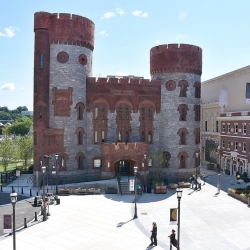
MGM Springfield’s overinflated projections are part of a growing trend with newly opened US casinos in the northeast.
MGM Springfield is not the big bad monster it was supposed to be. Or at least that is the analysis after four full months of revenue data, according to Connecticut budget planners.
Connecticut legislators feared that MGM Springfield’s grand opening on August 24, 2018 would spell economic doom for the state’s two tribal casinos, Mohegan Sun and Foxwoods. They expected as high as a 25% decline in slots revenues when the $960 million casino opened.
Instead, according to Connecticut Office and Policy and Management spokesman Chris McClure, the loss in revenues has been 9.2% overall. Any kind of decline is not good, but it is not the apocalyptic scenario that Connecticut lawmakers feared.
Mr. McClure said on Wednesday, “What has happened in reality is that Encore has been a little bit delayed. And when MGM came on board, we are still experiencing a decline, it’s just not as severe as we thought. I’m not sure we can accurately place where the variable are.”
Encore Boston Harbor’s Impact
The reference to Encore Boston Harbor is a reminder that Foxwoods Casino and Mohegan Sun are still not out of the woods. The $2.4 billion Boston area casino likely will have an economic impact on the Connecticut casinos, as well. The two tribal casinos have drawn Boston gamblers for a quarter century.
Encore Boston Harbor might be delayed further. The Massachusetts Gaming Commission still has not completed its investigation and report on Wynn board’s worthiness to receive an MGC gaming license. Currently, a US district judge in Nevada will not release Steve Wynn’s documents to the Massachusetts regulators to let them make a decision.
Still, it appeared that Connecticut lawmakers and casino executives had bought the press MGM Resorts put forward in its pre-opening financial statements. MGM Springfield has failed to reach its own projections — by a lot.
MGM Springfield Revenue Projections
MGM Springfield expected $418 million per year in revenues over its first year of operation, which would equate to roughly $34 million a month. Instead, the revenue figures have been $23 million a month. It is roughly two-thirds of the projection, which is a significant gap.
It is similar to the failed projections by New York state casinos which opened in the past couple of years: Rivers Casino in Schenectady, Del Lago Resort, and Resorts World Catskills. All three casino’s revenues were significantly under the projected figures, causing one of the casino operators to ask for a tax break — a suggestion that did not go over well with New York legislators.
Connecticut Trade Shows, Live Shows Continue
Almost as surprising is the fact MGM Springfield has not impacted entertainment or trade show revenues at the Connecticut casinos. MGM Resorts had suggested concerts, live shows, and trade shows would move their business to the Springfield resort, because it had nicer and newer facilities.
The prediction made sense. MGM Springfield is roughly 2 hours and 40 minutes from New York City, while the Big Apple is the same travel time to Foxwoods and ten minutes closer to Mohegan Sun. Faced with a similar travel time, one would expect conventions and shows to go to the newer, trendier facility. The same could be said about visitors from all over New England.
Instead, it appears that old business ties appear to be holding — at least for the time being. Non-gaming revenues have not been that impacted by the MGM Springfield.
For now, Connecticut’s treasury looks like it will receive higher tax revenues from the casinos than expected. The projected figure for fiscal year 2018, which ends on June 30, is $248.6 million in Indian Gaming Revenue. As late as November, the projected figure was $223.6 million.
Ned Lamont’s Plans for Casino Revenue
Former Gov. Dannell P. Malloy and newl Gov. Ned Lamont have been planning for the economic impact for years. Mohegan Sun and Foxwoods Casino had convinced the Connecticut legislature and Gov. Malloy to back an East Windsor casino, which was designed as a firewall for Hartford-area residents the state was concerned might gamble in Springfield.
The Hartford casino looked as if it would be under construction if not built by now, but the U.S. Interior Department’s Indian Affairs Bureau denied the tribes the federal approval to begin work on the joint venture. Now one is left to wonder whether the East Hartford casino ever will be built, despite Ryan Zinke leaving his post at the Department of Interior.
Whatever the case, the revenue decline feared by Connecticut officials appears to have been grossly overexaggerated. While casino executives at Mohegan Sun and Foxwoods are not likely to be pleased with losing 9% of their slots revenue (about 6% overall), it is a far cry from what many thought the decline would be.
